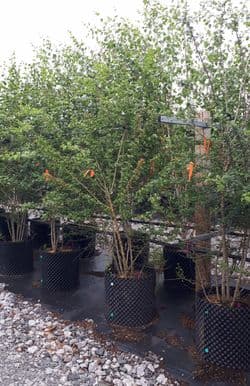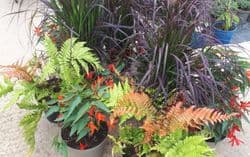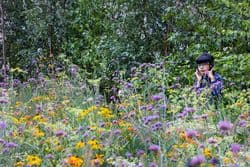Growing PoliNations: meet the nurserymen - Adam Pope, Palmstead Nurseries!
Dreamt up by Trigger and brought into reality by a standout team of horticulturalists, growers and gardening experts, the PoliNations super garden is coming together with an extraordinary amount of expertise behind it.
Sustainability is at the heart of the garden concept, along with the desire to create a vibrant, lush and colourful oasis for our festival site. We spoke with three nurserymen behind many of the trees, shrubs and plants that'll be bringing Victoria Square to life this September: read on to hear how they are approaching the project, managing sustainability and ensuring the incredible selection of flowers bloom right on time...
Part One: Adam Pope, Palmstead Nurseries
How many of your different species are involved in this project, and do any of these have particular challenging growing requirements?
The species we’ve grown for PoliNations are a small proportion of the 1000s of lines we grow, but they are important native species for the UK.
The variety of plants, although native, can be challenging to grow as can all plants. Pest and disease, weather and the location where they are growing are all factors that need to be carefully considered for the best results.
PoliNations takes place fairly late in the year - almost autumn. Which of the varieties being grown will benefit from this in their appearance?
Most of the plants we are growing for this project are deciduous so will have good autumn leaf colour. The roses, lavender and fuchsia should still have a few flowers on so will provide some flowering colour.
There are other plants that may be starting to lose their leaf but will provide interest with stem colour and shape, and the Corylus will also be almost finished forming their fruit: the hazelnut.
In what ways have sustainable practices been considered in this growing project?
At Palmstead we try to be as sustainable as possible. We recycle all water which we store in 3 large reservoirs. This includes rainwater run off from buildings and poly tunnels and irrigation run off. We collect and store our own electricity through solar panels, which run the pumps for the irrigation and all office appliances.
Any plants we have needed to pot up have been potted into recyclable pots, and all of our growing is considered with as soft a footprint on the environment as possible.
Are there any varieties being used that are particularly attractive to specific wildlife?
The Euonymus europaeus will not only be attractive for its leaf and fruit but they also attract birds and insects. Bees will love the lavender and roses. Aphid will flock to the Euonymus, Corylus and Cornus which in turn will bring their predators like ladybirds. Squirrels, mice and voles will love the hazelnuts.
And finally, do you have a good plant fact you can share with us?
The oldest living trees in the UK are Yew trees (Taxus baccata): their life spans can be up to 3,000 years old. If you are ever looking for living history on your doorstep just have a look in your local Church yard. There is sure to be one there.




